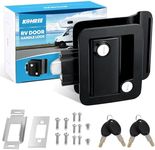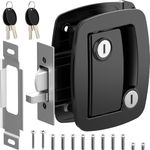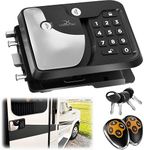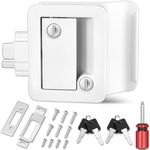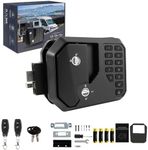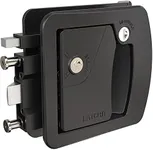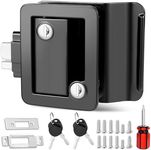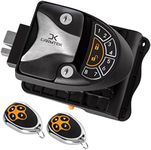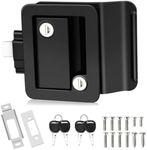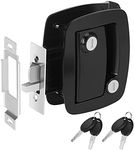Buying Guide for the Best Rv Door Lock
Choosing the right RV door lock is essential for both security and convenience while traveling or living in your recreational vehicle. A good lock not only keeps your belongings safe but also gives you peace of mind when you’re away from your RV. When shopping for an RV door lock, it’s important to consider how it will fit your door, how easy it is to use, and what level of security it provides. Understanding the key features will help you make a choice that matches your needs and lifestyle.Lock TypeThe lock type refers to the mechanism used to secure your RV door, such as mechanical (keyed), electronic (keypad or remote), or combination locks. This is important because it affects both security and convenience. Mechanical locks are traditional and reliable, while electronic locks offer features like keyless entry and sometimes remote control. If you prefer simplicity and don’t want to worry about batteries, a mechanical lock might be best. If you want quick access and modern features, an electronic lock could be a better fit. Consider your comfort with technology and how often you’ll use the lock when deciding.
Material and Build QualityMaterial and build quality determine how durable and secure the lock will be. Most RV door locks are made from metal alloys, with some offering reinforced or weather-resistant designs. This matters because a sturdy lock can resist tampering and withstand harsh outdoor conditions. Lighter materials may be easier to install but might not offer the same level of protection. If you travel in areas with extreme weather or are concerned about break-ins, look for locks with solid metal construction and weatherproof features.
Compatibility and SizeCompatibility and size refer to whether the lock will fit your RV door’s thickness and cutout dimensions. This is crucial because RV doors come in different sizes, and not all locks are universal. Most locks specify the range of door thicknesses and the size of the hole required for installation. To pick the right one, measure your door and check the lock’s specifications to ensure a proper fit. If you’re replacing an existing lock, try to match the new lock’s size to avoid extra modifications.
Ease of InstallationEase of installation describes how simple it is to put the lock on your RV door, either by yourself or with minimal help. Some locks are designed for quick, tool-free installation, while others may require drilling or special tools. This is important if you prefer to do things yourself or want to avoid hiring a professional. If you’re not handy, look for locks that advertise easy or tool-free installation. If you’re comfortable with DIY projects, you might consider more complex locks for added features.
Security FeaturesSecurity features include things like anti-pick technology, deadbolts, alarm integration, or multiple locking points. These features are important because they add extra layers of protection against break-ins. Some locks have simple latches, while others offer advanced security measures. If you’re often in remote areas or leave your RV unattended, prioritize locks with enhanced security features. If you mostly stay in secure campgrounds, basic security may be sufficient.
User ConvenienceUser convenience covers aspects like keyless entry, illuminated keypads, backup keys, and ease of locking or unlocking. This matters because it affects your daily experience using the lock. Keyless entry is great if you don’t want to carry keys, while illuminated keypads help at night. If you have family or guests, consider locks that allow multiple codes or easy reprogramming. Think about who will use the lock and how often, and choose features that make access simple for everyone.

